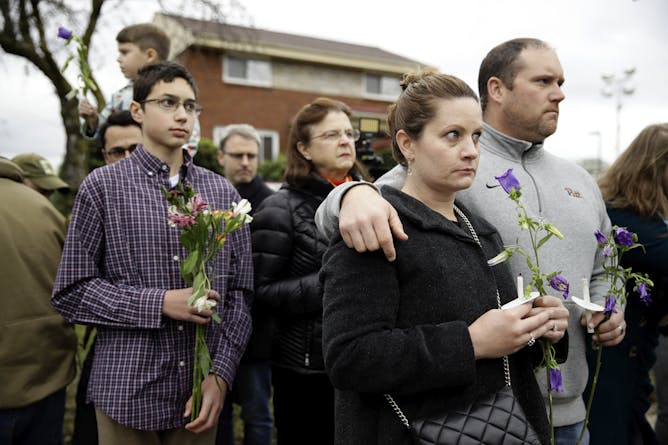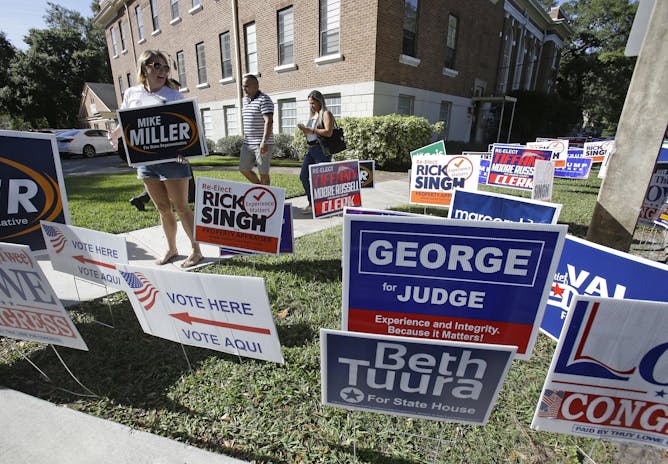Editor's note
|
|
Eleven people were killed on Saturday when a gunman opened fire on worshippers at the Tree of Life synagogue in Pittsburgh. The gunman allegedly shouted “All Jews must die” before he carried out what may have been deadliest attack on Jews in American history. Boston University’s Ingrid Anderson examines the rise of anti-Semitic and anti-immigrant sentiment and compares the current reality to the United States between World
War I and World War II. And Arie Perlinger, a professor of security studies at the University of Massachusetts Lowell considers what could be driving a recent surge in political violence.
After the most polarized campaign in its modern history, Brazil has elected as president a right-wing former army captain who disdains civil rights and admires military dictatorship. President-elect Jair Bolsonaro’s populist anger resonated with voters furious over Brazil’s political corruption, violence and economic stagnation. But international studies professor Helder Ferreira do Vale wonders if the country’s faltering
young democracy will survive its extremist new leader.
Money in politics? It’s bad, there’s too much of it and something must be done. At least that’s what 70 percent of Americans say. But, as University of Florida political scientist Suzanne Robbins writes, focusing on the putative evils of money diminishes the ways money is essential for political campaigns.
|
Kalpana Jain
Senior Religion + Ethics Editor
|

|
|
Top stories
|

People place flowers at the Tree of Life synagogue in Pittsburgh.
AP Photo/Matt Rourke
Ingrid Anderson, Boston University
After the killing of 11 people at a synagogue in Pittsburgh, a scholar explains why this hate crime reminds her of the political climate between the two world wars in the US.
|

Bolsonaro supporters celebrate outside his home in Rio de Janeiro after exit polls on Oct. 28 declared him the preliminary winner of Brazil’s 2018 presidential election.
AP Photo/Leo Correa
Helder Ferreira do Vale, Hankuk University of Foreign Studies
Jair Bolsonaro, a right-wing congressman and former army captain, is Brazil's next president, with 56 percent of votes. Critics see a threat to democracy in his scathing attacks on Brazilian society.
|

Money in politics? Somebody’s got to pay for those signs.
AP/John Raoux
Suzanne Robbins, University of Florida
Is money the root of all evil in politics? It’s easy to see a correlation between winning and fundraising – money flows to likely winners and competitive races. But correlation is not causation.
|
Politics + Society
|
-
Arie Perliger, University of Massachusetts Lowell
The attack at a synagogue in Pittsburgh and the sending of pipe bombs to critics of the current administration are examples of the increase in the violence on the margins of the right.
-
John Rennie Short, University of Maryland, Baltimore County
One of the main reasons polarization in the US is on the rise – the way congressional seats are drawn to favor parties – isn't going away anytime soon.
|
|
|
|
|
|
|
|
|
|
|
|
Trending on site
|
-
Wenyao Xu, University at Buffalo, The State University of New York; Feng Lin, University of Colorado Denver; Zhanpeng Jin, University at Buffalo, The State University of New York
Biometrics are more secure than passwords – but when they're compromised fingerprints and retina scans are hard to reset. Brain responses to specific stimuli are as secure and, crucially, resettable.
-
Erin Young, University of Connecticut
Researchers are exploring the genetic differences that dictate why some people suffer greater pain than others, and how to translate these findings into personalized pain treatments.
-
David Prologo, Emory University
Just what role does exercise play in weight loss? Plenty. While word has spread in recent years that physical activity isn't all that important, a doctor debunks that myth.
|
|
Today’s chart
|
-

 |
Stacie B. Dusetzina
Vanderbilt University
|
| |
| |
| |
|
|